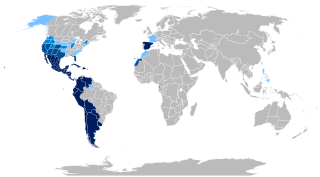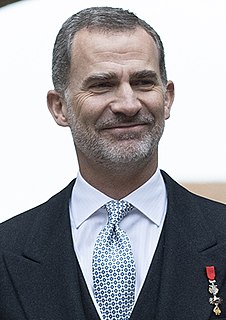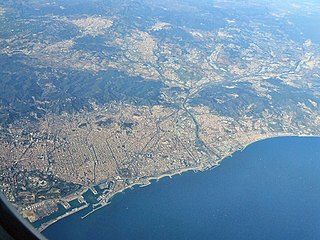
Colombia, officially the Republic of Colombia, is a transcontinental country spanning South America and an insular region in North America. It is bordered by the Caribbean Sea to the north, Venezuela to the east, Brazil to the southeast, Ecuador and Peru to the south, the Pacific Ocean to the west, and Panama to the northwest. Colombia comprises 32 departments and the Capital District of Bogotá, the country's largest city. It covers an area of 1,141,748 square kilometers (440,831 sq mi), with a population of 50 million. Colombia's rich cultural heritage reflects influences by various Amerindian civilizations, European settlement, African slaves, and immigration from Europe and the Middle East. Spanish is the nation's official language, besides which over 70 languages are spoken.

Francisco Franco Bahamonde was a Spanish general who led the Nationalist forces in overthrowing the Second Spanish Republic during the Spanish Civil War and thereafter ruled over Spain from 1939 to 1975 as a dictator, assuming the title Caudillo. This period in Spanish history, from the Nationalist victory to Franco's death, is commonly known as Francoist Spain or the Francoist dictatorship.

Spain, or the Kingdom of Spain, is a country in southwestern Europe with parts of territory in the Atlantic Ocean and across the Mediterranean Sea. The largest part of Spain is situated on the Iberian Peninsula; its territory also includes the Canary Islands in the Atlantic Ocean, the Balearic Islands in the Mediterranean Sea, the autonomous cities of Ceuta and Melilla, and several minor overseas territories also scattered along the Moroccan coast of the Alboran Sea. The country's mainland is bordered to the south by Gibraltar; to the south and east by the Mediterranean Sea; to the north by France, Andorra and the Bay of Biscay; and to the west by Portugal and the Atlantic Ocean.

Spanish is a Romance language of the Indo-European language family that evolved from colloquial spoken Latin in the Iberian Peninsula of Europe. Today, it is a global language with nearly 500 million native speakers, mainly in the Americas and Spain. It is the world's second-most spoken native language after Mandarin Chinese; the world's fourth-most spoken language overall after English, Mandarin Chinese, and Hindi; and the world's most widely spoken Romance language.

Spanish cuisine consists of the cooking traditions and practices from Spain. Olive oil is heavily used in Spanish cuisine. It forms the base of many vegetable sauces. Herbs most commonly used include parsley, oregano, rosemary and thyme. The use of garlic has been noted as "common to all Spanish cooking." The most used meats in Spanish cuisine include chicken, pork, lamb and veal. Fish and seafood are also consumed on a regular basis.

The Campeonato Nacional de Liga de Primera División, commonly known simply as Primera División in Spain, and as La Liga in English-speaking countries and officially as LaLiga Santander for sponsorship reasons, stylized as LaLiga, is the men's top professional football division of the Spanish football league system. Administered by the Liga Nacional de Fútbol Profesional, it is contested by 20 teams, with the three lowest-placed teams at the end of each season being relegated to the Segunda División and replaced by the top two teams and a play-off winner in that division.

The Campeonato de España–Copa de Su Majestad el Rey, commonly known as Copa del Rey or simply La Copa and formerly known as Copa del Generalísimo (1939–76), is an annual knockout football competition in Spanish football, organized by the Royal Spanish Football Federation.

Felipe VI or Philip VI is King of Spain. He ascended the throne on 19 June 2014 upon the abdication of his father, Juan Carlos I. His mother is Queen Sofía, and he has two elder sisters, Infanta Elena, Duchess of Lugo, and Infanta Cristina. In 2004, Felipe married TV news journalist Letizia Ortiz with whom he has two daughters, Leonor and Sofía.

Barcelona is a province of eastern Spain, in the center of the autonomous community of Catalonia. The province is bordered by the provinces of Tarragona, Lleida, and Girona, and by the Mediterranean Sea. Its area is 7,726 km2 (2,983 sq mi). 5,743,402 people live in the province, of whom about 29% (1,664,182) live within the administrative limits of the city of Barcelona, which itself is contained in the Barcelona metropolitan area.

Spain and its 17 autonomous communities are subdivided into 50 provinces. Spain's provincial system was recognized in its 1978 Constitution but its origin dates back to 1833 with a similar predecessor from 1822. Ceuta, Melilla, and the plazas de soberanía are not part of any provinces.

The Kingdom of Aragon was a medieval and early modern kingdom on the Iberian Peninsula, corresponding to the modern-day autonomous community of Aragon, in Spain. It should not be confused with the larger Crown of Aragon, which also included other territories — the Principality of Catalonia, the Kingdom of Valencia, the Kingdom of Majorca, and other possessions that are now part of France, Italy, and Greece — that were also under the rule of the King of Aragon, but were administered separately from the Kingdom of Aragon.

The Spain national football team represents Spain in international men's football competitions since 1920. It is governed by the Royal Spanish Football Federation, the governing body for football in Spain. Spain is one of the eight national teams to have been crowned world champions, having participated in a total of 16 of 22 FIFA World Cups and qualifying consistently since 1978. Spain also won three continental titles, having appeared at 11 of 16 UEFA European Championships. Spain currently competes in Division A at the UEFA Nations League alongside the other top teams of Europe. Their best result was in the 2020–21 season where they reached the final, losing to France.
Spanish postal codes were introduced on 1 July 1984, when the Sociedad Estatal de Correos y Telégrafos introduced automated mail sorting. They consist of five numerical digits, where the first two digits, ranging 01 to 52, correspond either to one of the 50 provinces of Spain or to one of the two autonomous cities on the African coast.
The Campeonato Nacional de Liga de Segunda División, commercially known as La Liga 2 and stylized as LaLiga SmartBank for sponsorship reasons, is the men's second professional association football division of the Spanish football league system. Administrated by the Liga Nacional de Fútbol Profesional, it is contested by 22 teams, with the top two teams plus the winner of a play-off promoted to LaLiga and replaced by the three lowest-placed teams in that division.

Unión Deportiva Almería, S.A.D. is a Spanish football club based in Almería, in the autonomous community of Andalusia. Founded on 26 July 1989 and known as Almería Club de Fútbol until 2001, when it was renamed Unión Deportiva Almería. The club plays in Spain's Segunda División, and plays their home games at Estadio de los Juegos Mediterráneos, with a 15,274-seat capacity.

Madrid is the capital and most populous city of Spain. The city has almost 3.4 million inhabitants and a metropolitan area population of approximately 6.7 million. It is the second-largest city in the European Union (EU), surpassed only by Berlin in its administrative limits, and its monocentric metropolitan area is the second-largest in the EU, surpassed only by Paris. The municipality covers 604.3 km2 (233.3 sq mi) geographical area.

Rosalia Vila Tobella, known mononymously as Rosalía, is a Spanish singer and songwriter. After discovering Spanish folk music at an early age, Rosalía attended Taller de Músics and graduated from the Catalonia College of Music with honors by virtue of her collaborative cover album with Raül Refree, Los Ángeles (2017), and the baccalaureate project El Mal Querer (2018), which is co-produced by El Guincho and mixes modern interpretations of flamenco with pop and urban music. Spawning singles like "Malamente", the album caught the attention of the Spanish general public, and was released to universal critical acclaim. Recipient of the Latin Grammy Award for Album of the Year and listed in Rolling Stone's 500 Greatest Albums of All Time, El Mal Querer started the ascent of Rosalía into the international music scene.
2022 in film is an overview of events, including award ceremonies, festivals, a list of country-specific lists of films released, and notable deaths.















